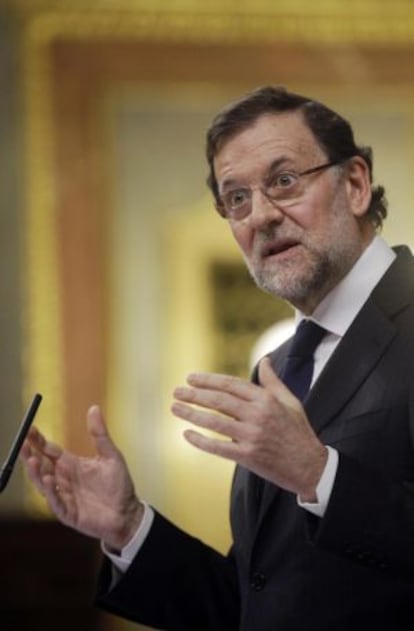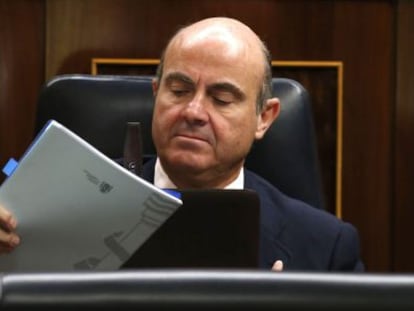Spain formally exits bank bailout program in better shape
But Brussels warns challenges still exist in fragile economic recovery and soaring bad loans Rajoy expresses hope for the future “and the present”

Spain on Thursday will formally exit the program it entered in exchange for a 41.3-billion-euro loan from its European partners to clean up the banking system, with the economic and financial scenario looking a lot better than when it asked for the bailout some 18 months ago.
Foreign investor confidence in the country has been restored with the risk premium back below 200 basis points; the labor market has stabilized, albeit with the jobless rate still unacceptably high at 26 percent; the economy has emerged from its longest recession since the restoration of democracy, although growth remains anemic; and the asset management corporation Sareb, or so-called bad bank set up to absorb the toxic real estate assets of the nationalized banks, is up and running.
However, doubts remain.
“The bailout has worked surprisingly well in all aspects but the still-fragile economic situation continues to weigh on financial stability,” an official European source said.
The quality of the banks’ assets continues to deteriorate with the non-performing loan ratio moving above 13 percent in November for the first time on record, while the slump in the property market after a decade-long boom that ended around the start of 2008 has yet to fully run its course.
I believe the worst is over and that we are now on the path to recovery”
Bank lending has also dropped due to a lack of what lenders says is “solvent” demand, although they have become extremely wary about lending with an eye to preserving their balance sheets. Banks are also heavily exposed to Spanish sovereign debt, which remains high, as does that of the private sector, while bank margins remain challenged.
In the face of this scenario, Brussels believes Spanish lenders should gird themselves with sufficient capital, particularly ahead of the balance sheet and stress tests they will be subjected to by the European Central Bank (ECB) this year. However, the European official source acknowledged that: “Despite everything, fortunately Spain is far from the worst stress scenarios than could have been suggested 18 months ago.”
The Commission is also urging the government to privatize the remaining banks that were nationalized as soon as possible. Regarding the bad bank, the source said: “The Sareb has 15 years to sell its assets, and although its business plan, and in particular the sale of assets will be a challenge over the next few years, it doesn’t look like there will be serious problems if the real estate market stabilizes and we are already seeing the first signs of this.”
The other pending tasks for the conservative Popular Party government of Prime Minister Mariano Rajoy are a further turn of the screw of the labor reform introduced in February 2012 and an overhaul of the tax system to make it more efficient and help reduce the structural deficit.
In respect of the latter challenge, Finance Minister Cristóbal Montoro on Wednesday denied the government is planning to further hike value-added tax rates after earlier increasing the standard rate to 21 percent from 18 percent and the reduced rate to 10 percent from 8 percent.
“The government has no plans to increase the VAT rate,” Montoro said in the lobby of Congress. “We already did so in this legislature and what we are hoping for is increased collections as consumption picks up, which was what was beginning to happen at the end of 2013.”
Montoro said a group of experts is due to present their proposals for fiscal reform in the second half of next month. “The experts are working on it. We will listen to their proposals and on the basis of these the government will draw its conclusions and submit a bill on tax reform.”
During a debate in Congress on the outcome of the European Council meeting in December, Rajoy said the situation in Spain had changed for the better. “I look not only at the future but also the present with hope,” he said. “Although the unemployment figures in Europe, and in particular some member countries such as Spain, are still unacceptably high, I believe we can say that the worst is over and that we are now on the path to recovery.”
Tu suscripción se está usando en otro dispositivo
¿Quieres añadir otro usuario a tu suscripción?
Si continúas leyendo en este dispositivo, no se podrá leer en el otro.
FlechaTu suscripción se está usando en otro dispositivo y solo puedes acceder a EL PAÍS desde un dispositivo a la vez.
Si quieres compartir tu cuenta, cambia tu suscripción a la modalidad Premium, así podrás añadir otro usuario. Cada uno accederá con su propia cuenta de email, lo que os permitirá personalizar vuestra experiencia en EL PAÍS.
En el caso de no saber quién está usando tu cuenta, te recomendamos cambiar tu contraseña aquí.
Si decides continuar compartiendo tu cuenta, este mensaje se mostrará en tu dispositivo y en el de la otra persona que está usando tu cuenta de forma indefinida, afectando a tu experiencia de lectura. Puedes consultar aquí los términos y condiciones de la suscripción digital.









































